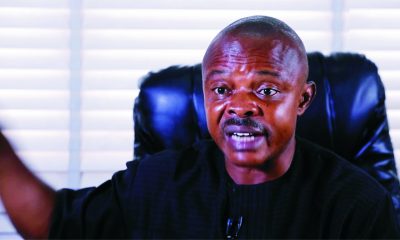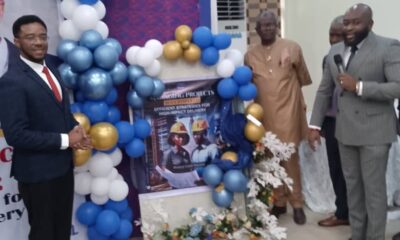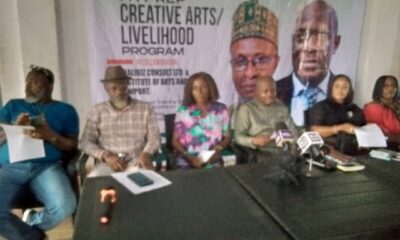Opinion
Who Speaks For Indigent Nigerians?
The pattern of public communication in Nigeria has over the years been deplorable. Public policy is hardly ever well publicized. The people are always in the dark about a policy, especially the roles they are to play to ensure its success. Indeed, the apparent disconnect between the government and the citizenry is due largely to poor public communication flow. Sometimes, it takes the form of no communication at all while at other times, it is occasioned by inaccurate or inadequate communication. Interestingly, because the real target of any policy is the people, the general public ought to be conversant with any matter of public interest. That is what is referred to as public enlightenment – a veritable prerequisite for national development.
The solution to the problems of development in a nation does not necessarily lie in massive construction of physical structures alone. In fact, the people may, due to ignorance, not appreciate such projects and could misuse them. There is, therefore, the urgent need to place greater emphasis on public enlightenment to prevent devastating mob actions like the burning of public buildings or the disruption of public power supply cables, among others.
A cursory look at the handling of the topical issue of fuel subsidy would show that in reality no one spoke for the indigent Nigerians. Recently, some sministers made a point that majority of protesters against the removal of fuel subsidy did not know why they were on the streets. That observation is, no doubt, correct because there is no way the down-trodden and uneducated indigent persons whom the ministers had in mind, would have known the issues at stake when they were not educated on the subject.
Government as usual takes for granted that people knew or ought to have known, without making effort to ascertain whether or not the issues at stake were known to them or whether those who were supposedly informed understood the message. In other words, the ministers were right that more often than not, people are instigated into protests. This is because the so-cal1ed instigators – the opposition political parties, are no 1ess contemptuous of our neglected indigent Nigerians. Indeed, the diction of the alleged instigators is the same as that of the government, a language which the poor masses do not understand. What, for example, would the uneducated have made out of the address on political mandarins by our dear ministers?
The question why then were the indigents on the streets should not be difficult to answer because they got there through what is called intra-personal communication. Some of them woke up on the first day of a new year to discover that the same amount of money which catered for certain needs the day before suddenly became greatly insufficient for the same needs as was the case with the January 1, 2012 fuel subsidy protest. They did not need to be educated to appreciate their deprivation as well as its suddenness. Thus, no one needed to instigate such persons to get into the streets. While some other persons who are unemployed and thus idle found good company in the streets, other idle hands seized an obviously conducive environment for looting. It was a classical case of people talking to themselves in the absence of communication.
There is, however, the argument that the fuel subsidy matter has, for a while, been the subject of debates here and there and as such it is wrong to say that no one speaks for the uneducated and indigent masses of this country. Here, we need to note that sectoral consolations and public enlightenment are two different issues. Whereas a few things may be said to douse tension or to discourage protest, they are of little relevance because those would essentially pass for what is known as panicky rejoinders. In addition, they are usually directed at the elite and not the indigent Nigerians.
Apart from the fact that the messages are neither timely nor easy to understand by the uneducated, the channels employed are usually inappropriate. Advanced technology has, no doubt, established that the best way to reach mass audience across distances is to use the mass media particularly radio, newspaper and television. But in Nigeria, the problems which the indigent Nigerians have with the media are too many.
Firstly, no many people have access to the media or can afford the channels. Secondly, the country’s erratic public power supply makes it difficult for people to listen to radio or watch television. The indigent masses cannot afford batteries for their radios let alone generators for television.
Thirdly, media practice in Nigeria is not only urban-based but exceedingly elitist. It is not grassroots-oriented. To start with the use of local languages which the people hear and understand is unfortunately uncommon. Consequently, media contents which are designed to inform, educate and entertain the people are not understood by them.
Therefore, there exists in Nigeria a visible disconnect between the media and a large percentage of their target audience. This is a major challenge yet to be met because the ideal thing is that people do not need to understand a foreign language to be able to know what is actually happening either in their country or elsewhere.
Sadly, community-based and community-owned radio and television stations, as well as newspapers, are rare in Nigeria. The decision of the Federal Radio Corporation of Nigeria (FRCN) to use its national stations to transmit over 12 Nigerian languages is commendable, but the corporation is yet to operate from all state capitals let alone in local communities. As for television, the Nigerian Television Authority (NTA) is supposed to have a total of 200 stations with no less than 80 in local communities, but there is doubt if the expansion project would be completed considering the trend of irregular capital grants to the Authority.
In the case of the print media, it is strange that a nation which had a newspaper, Iwe-Irohin, that was published in a local language as far back as 1859 is yet to come to grips with how to sustain community and local language newspapers. Consequently, to use any of these modern organs to communicate with the indigent Nigerians amounts to nothing.
Traditional institutions would probably have been useful but there is doubt if they are sufficiently committed to public policy to become its advocates.
What is more, modernity has overtaken the traditional channel, which is the town crier. One framework which would have been helpful is the use of cine rovers at the village square. Unfortunately, this has gone into disuse since 1993 when government merged the proscribed MAMSER with the Public Enlightenment Division of the Federal Ministry of Information and Communication which had metamorphosed into National Orientation Agency (NOA).
The great dream of the founding fathers of NOA, which was to use it as a grassroot channel to mobilize public support for government projects and policies has been abandoned, as the agency is now more often used to propagate culture. Who then speaks for indigent Nigerians on public policy? Toby writes from Port Harcourt.
Bethel Toby
Opinion
Nigeria’s Poor Economy And High Unemployment Rates

Nigeria, often referred to as the “Giant of Africa”, is endowed with vast natural resources,
a large population and a youthful workforce.
Despite these advantages, the country faces persistent economic challenges, most notably high unemployment rates over the years. Successive governments remain a central issue contributing to poverty, social unrest, and underdevelopment. The economic wellbeing of a nation is significantly tied to her employment levels.
In Nigeria’s case, high unemployment has become a key driver of its poor economic performance affecting everything from productivity and income levels to crime and political instability.
Unemployment in Nigeria has assumed a multidimensional nature, characterised not just by joblessness but also underemployment, informal employment and precarious working conditions.
The Nigeria National Bureau of Statistic (NBS) said the youth with over 60 percent of Nigeria’s population under the age of 30 percent youth unemployment is a time bomb threatening the nation’s future.
Many graduates leave universities and polytechnics annually with little or no hope of securing decent jobs.
This structural unemployment is the result of a mismatch between skills and labour market needs, inadequate industrialisation, and a weak private sector.
Unemployment affects an economy in numerous direct and indirect ways.
In Nigeria, it leads to a reduced consumer base, when large sections of the population are not earning steady incomes, they have limited purchasing power which in turn affects the production and growth of businesses. Companies produce less, invest less and hire fewer people, leading to a vicious cycle of low economic growth.
Moreover, high unemployment translates to lower tax revenue for the government with fewer people paying taxes. The government has fewer resources to fund infrastructure, education, healthcare, and other public services that stimulate economic development.
This fiscal weakness forces Nigeria to rely heavily on foreign loans, which leads to rising debt levels and economic vulnerability.
Furthermore, infrastructure deficits including inadequate power supply, poor road networks and limited access to credit make it difficult for small and medium sized enterprises (SMEs) to thrive, yet SMEs are the bedrock of employment in many developed nations. Nigeria’s weak support for SMEs stifles innovation and job creation.
Another tragic consequence of high unemployment is the mass exodus of Nigerian talent to foreign countries in search of better opportunities. The brain drain weakens the country’s human capital base and deprives it of professionals who could contribute meaningfully to national development.
The “Japa” phenomenon-a slang used to describe young Nigerians fleeing the country reflects deep disillusionment with the system. Doctors, nurses, software engineers and other professionals are leaving in droves. The cost of training these individuals is absorbed by Nigeria, but their expertise benefits foreign economics. This dynamic further deepens the economic challenges as the country loses its best and brightest minds.
Addressing unemployment in Nigeria requires a multifaceted approach, first.
Secondly, industrialisation must be prioritised. The government should create an enabling environment for local manufacturing by improving infrastructure, reducing Bureaucratic bottlenecks and offering tax incentives reviving the agricultural sector with modern techniques and supply chains can also absorb a significant portion of the unemployed.
Thirdly, Governments at all levels must be held accountable for implementing job creation programmes transparently and effectively. Public-Private Partnerships (PPPs) should be encouraged to drive innovations and employment in ICT, renewable energy and logistics.
Finally, Nigeria must diversify its economy away from crude oil and invest in sectors that generate mass employment. Tourism, education, healthcare and creative industries such as film and music hold immense unlapped potential.
With genuine commitment from leaders, strong institutions and the active participation of the private sector and civil society, Nigeria can turn the tide on unemployment and chart a path toward sustainable economic prosperity.
Idorenyi, an intern with The Tide, is a student of Temple Gate Polytechnic
Abia State.
Biana Idorenyin
Opinion
Ending Malaria Menace For Improved Health

April 25 every year is World Malaria Day. It was instituted by the World Health Assembly in 2007, “to highlight the progress made in Malaria control, the ongoing challenges that persist and the urgent need for sustained investment and innovation”. This year’s theme, “Malaria Ends with Us: Reinvest, Reimagine and Reignite”, is apt considering the loss of lives incurred and money spent to treat and prevent Malaria. The theme is a clarion-call to intentionally end the malaria scourge through robust commitment of human and financial resources.
That is why one of the best policies, of the suspended Sir Siminalayi Fubara’s administration in Rivers State, was the avowed commitment to check the malaria menace and its multiplier consequences on the residents of the State, through its “Free Malaria Testing and Treatment” innovation.
Rivers State is a microcosm of Nigeria in terms of residents; thus the secularity of the State makes the programme’s beneficiary all-inclusive.
No doubt, the Rivers State Government has by this initiative reinforced value placement on the lives of the people, especially the less-privileged in the State. Residents in Rivers State can now be tested and treated free for Malaria in any Rivers State Government- owned hospitals and healthcare centres across the 23 Local Government Areas of Rivers State. This is a lofty and laudable programme because of the prohibitive cost of malaria drugs and conducting tests at a time majority of Nigerians hardly have a meal to eat, because of the prevailing economic hardship in the country.
Malaria and Typhoid, according to medical and health statisticians are the commonest ailments people suffer as a result of dirty environment, absence of good drainage, lack of potable water. The State Government’s Malaria programme is, therefore, not just a big financial relief but also a life-saver for the teeming poverty-ridden population of Nigeria resident in Rivers State.
According to statistics reeled out by the Federal Ministry of Health and Social Welfare, “Globally, there are an estimated 249million malaria cases and 608,000 malaria deaths among 85 countries”. Such reports leave much to be desired in a nation so blessed with natural resources and manpower. This is why the Rivers State Government should be commended for defying the huge financial implications to drive the lofty programme for Nigerians and foreigners in Rivers State who are availed the privilege of accessing the largesse in all State Government health and medical facilities.
As the Rivers State Government deemed it necessary to initiate the Free Malaria Testing and Treatment programme, nothing stops the Federal Government from doing the same. But even with abounding natural and human resources in unimaginable quantity in Nigeria, Malaria programmes are either grossly underfunded, or funds for the programmes are misappropriated or embezzled with impunity.
In Nigeria, malaria is one of the leading causes of death of children under the age of six and pregnant women. Malaria is a nightmare in Nigeria so much so that price of its drugs and treatment have skyrocketed like a phoenix and outrageously outside the reach of the teeming less privileged citizens of Nigeria. The situation was so alarming that the National Assembly, in 2023 urged the Federal Government to declare Malaria an emergency in Nigeria as a matter of urgent national interest. I am not sure that has been done by the Federal Government because it seems to be in the interest of the common citizens.
Experts have recommended new approaches to fighting the malaria epidemic in Nigeria which seems to have defied continuous attempts to reduce the Malaria burden in Nigeria to zero.
According to a Senior Associate at the John Hopkins Bloomberg School of Public.Health, Soji Adeyi, Nigeria should begin to increase internal funding.for malaria elimination.
According to him,, “Each year reliance on external funding needs to be reduced. I looked at the summary of Malaria reports from 2008 till now and what has been common is the complaint about the lack of funding. If this is a recurring problem, what should be done is to find a new approach “.
In his view, Abdu Muktar, National Coordinator of the Presidential Healthcare Initiative, called for the local production and manufacturing of medical supplies as well as reducing Nigeria’s dependence on drugs imports.
According to him, the local production of anti-malaria and.related.medication will consider.the peculiarity of the country’s terrain, population and burden and.would improve access to effective treatment.
For his part, the regional. Director of World Health Organisation (WHO), African Region, Matshiddiso Moretti, advised Nigeria to accelerate its efforts to end Malaria by relying on adequate data for the implementation of health policies.
Malaria is an epidemic more devastating than the dreaded HIV/AIDS. Malaria triggers high blood pressure and places HIV/AIDS patients on a critical condition. The Federal and sub-national governments should therefore declare Malaria an emergency and prioritise attention to its treatment, production and importation of drugs and vaccines to stem the malaria menace.
The Federal Government should also improve incentives and remuneration of medical and health workers to end their exodus abroad in droves, for greener pastures.
Igbiki Benibo
Opinion
Respecting The Traditional Institution
The traditional institution is as old as human society. It predates the advent of modern organised society. Before the emergence of modern justice system of dispute resolution and political system of administration, the traditional institution has existed long ago. In fact, it was so revered and regarded as sacred because of the mythological conviction that it was the “stool of the ancestors”. Consequently, judgment given was deified as many people especially the traditionalists believe it was the mind of the gods revealed. Perversion of justice , in the pre-modern justice system was alien and considered uncommon. Chiefs and traditional rulers though may not have generated knowledge formally (through the four walls of a classroom), yet they embody and exemplify knowledge. They hold fast the virtue of integrity and honour, fairness and relative impartiality, partly because they believed that the stool they occupy was ancestral and traditional as act of indiscretion can court the wrath of the gods at whose behest they are on the traditional saddle of authority.
The Compass of Life stated unequivocally that “the throne is preserved by righteousness”. Where righteousness, integrity and honesty are savoured,and valued, perversion and miscarriage of justice is an anomaly. The judgments of traditional rulers and chiefs were hardly appealed against because they were founded on objectivity, fairness, truth and facts beyond primordial sentiment and inordinate interests or pecuniary benefits. Judgments were precedent. Traditional rulers and chiefs, therefore carved a niche for themselves, earning the respect of, and endearing themselves to the heart of their subjects. Is it the same today? Some traditional rulers and chiefs are administering their communities in exile; they are diasporic leaders because they have lost the confidence of the people through self-serving, raising of cult group for self-preservation, land grabbing and other flagrant corrupt practices.
When truth is not found in the traditional institution that, in my considered view, constitutes the grassroots government, then crisis is inevitable.In most African societies before advent of the Christian Faith, and consequent Christening of the traditional stools in many communities in recent times, ascent to the traditional institution was a function of a traditional method of selection. It was believed that the gods make the selection. And whoever emerges from the divination processes eventually is crowned as the king of the people after performing the associated rituals.Whoever lacked the legitimacy to sit on the throne but wanted to take it forcefully, traditionalists believed died mysteriously or untimely. Traditional rulers wielded much influence and power because of the authority inherent in the stool, the age of the person designated for the stool notwithstanding. The word of the king was a law, embodied power. Kings so selected are forthright, accountable, transparent, men of integrity, did not speak from both sides of the mouth, could not be induced with pecuniary benefits to pervert justice, they feared the gods of their ancestors and were consecrated holistically for the purpose dictated by the pre and post coronation rituals.
Some of those crowned king were very young in those days, but they ruled the people well with the fear of the gods. There was no contention over who is qualified to sit or who is not qualified to. It was the prerogative of the gods. And it was so believed and upheld with fear.Kings were natural rulers, so they remained untouchable and could not be removed by a political government. If a king committed an offence he was arrested and prosecuted according to the provision of the law. But they have immunity from sack or being dethroned because they are not political appointees. However, the people at whose behest he became king reserved the power to remove him if found guilty of violating oath of stool. The traditional institution is actually the system of governance nearest to the people. And kings were the chief security officers of their communities. So indispensable are the roles of kings and traditional rulers to the peaceful co-existence of their people, ensuring that government policies and Programmes were seamlessly spread to the people that many people are clamouring for the inclusion of definite and specific roles in the Constitution for the traditional institution.
Traditional rulers are fathers to every member of their domain. So they are not expected to discriminate, show favouritism. By their fatherly position traditional rulers, though can not be apolitical, are also expected to be immune from partisan politics. This is because as one who presides over a great house where people of different political divide or interest belong, an open interest for a political party means ostracisation of other members of the family which could lead to disrespect, conflict of interest, wrangling and anarchy. Traditional rulers are supposed to be selfless, preferring the interest of their people above their personal interests following the consciousness that they are stewards whose emergence remains the prerogative of the people. The position is essentially for service and not for personal aggrandisement and ego massaging. So they should hold the resources of the people in trust. However, in recent past the traditional institution has suffered denigration because of unnecessary emotional attachment to political parties and political leaders. Some traditional rulers and kings have shown complete disregard to the principle of neutrality because of filthy lucre and pecuniary gains, at the expense of the stool and people they lead. Sadly some traditional rulers have been influenced to pervert justice: giving justice to the offender who is rich against the poor.
Traditional leaders should be reminded that the “throne is preserved by righteousness”, not by political chauvinism, favouritism, or materialism.Traditional rulers should earn their deserved respect from political leaders by refusing the pressure to be subservient, beggarly, sycophantic and docile. Traditional leaders have natural and permanent leadership system, unlike the political leadership that is transient and tenured.They should be partners with every administration in power and should not be tied to the apron string of past leaders whose activities are aversive to the incumbent administration and thereby constituting a clog in the development of the State and the community they are to woo infrastructure development to. It is unpardonable error for a traditional ruler to have his conscience mortgaged for benefits he gets inordinately from any government.It is necessary to encourage kings and traditional rulers to not play the roles of stooges and clowns for the privileged few, political leaders. Political leaders are products of the people, even as every government derives its legitimacy from the people.
No doubt, the roles of traditional rulers are so necessary that no political or military government can operate to their exclusion. This is why the 10th National Assembly mulled the inclusion of Traditional institution in the proposed amendment of the Constitution of the Federal Republic of Nigeria.Traditional rulers and chiefs should, therefore, be and seen to be truthful, forthright, bold, courageous, honest and people of integrity, not evasive, cunning, unnecessarily diplomatic and economical with truth.The time to restore the dignity of the traditional institution is now but it must be earned by the virtuous disposition of traditional rulers and chiefs.
Igbiki Benibo
-

 News5 days ago
News5 days ago2025 UTME: JAMB Disowns Site Requesting Payment From Candidates
-

 News5 days ago
News5 days agoMay Day: Labour Seeks Inclusiveness In Policy-making
-

 Niger Delta5 days ago
Niger Delta5 days agoRivers Begins, Supplemental Polio Vaccination, Morrow
-

 Featured5 days ago
Featured5 days agoRSG Commits To Workers’ Welfare …. Calls For Sustained Govt, Labour Partnership
-

 Rivers5 days ago
Rivers5 days agoBook Title “Managing Projects Successfully” Launch In Port Harcourt
-

 Nation5 days ago
Nation5 days agoHYPREP Inducts 100 Ogoni Youths For Creative Arts Training
-
Rivers5 days ago
Citizenship Participation Key to Achieving True Democratic Government
-
Rivers5 days ago
Obi Donates 80 Desks To Schools In Etche

